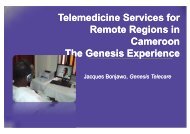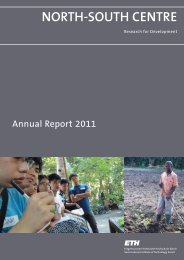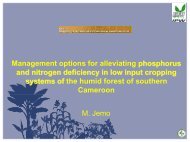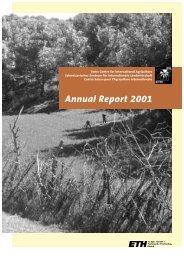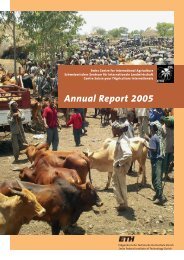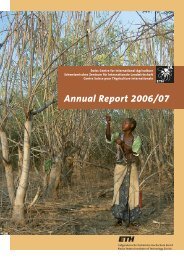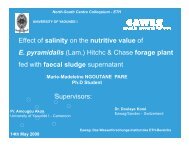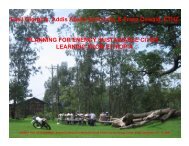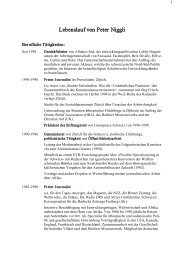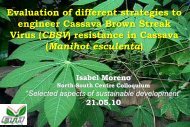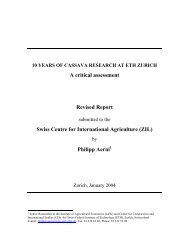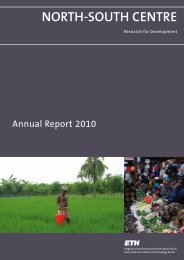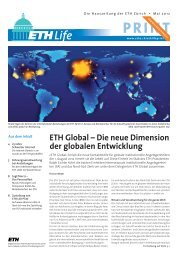NORTH-SOUTH CENTRE - ETH - North-South Centre North-South ...
NORTH-SOUTH CENTRE - ETH - North-South Centre North-South ...
NORTH-SOUTH CENTRE - ETH - North-South Centre North-South ...
You also want an ePaper? Increase the reach of your titles
YUMPU automatically turns print PDFs into web optimized ePapers that Google loves.
academic community and by explicitly valuing R4D activities.<br />
In this context, research institutions (in contrast to universities)<br />
have the advantage that permanent research staff<br />
can conduct R4D activities that require long-term engagement.<br />
All academic research institutions, however, must be<br />
willing to trust in their researchers over appropriate time<br />
horizons and to avoid overly simplistic indicators.<br />
Outlook<br />
Research for development presents one specific case of the<br />
general question of how academic institutions should contribute<br />
to society. Academic institutions must determine<br />
appropriate balances between applied and fundamental research,<br />
between the generation and transfer of knowledge,<br />
and balance between the transfer of knowledge within and<br />
outside the academic community.<br />
It is not reasonable to expect a single simple answer or perfect<br />
solution for all academic institutions or even for any<br />
single institution. The contributions of academic institutions<br />
to societies must account for different opportunities<br />
in different fields and also for the different interests and<br />
talents of individuals. It would, perhaps, be best to take a<br />
pragmatic and adaptive approach that evolves over time in<br />
response to changing opportunities and constraints.<br />
Close interaction between researchers and local<br />
practitioners on an applied research project in Burkina Faso<br />
In considering how to meet the future challenges in R4D, it<br />
is both important and inspiring to recall the many significant<br />
contributions that academic researchers have already<br />
made, and continue to make, in this field. All of us who are<br />
interested in conducting and promoting R4D can learn from<br />
their experiences to imitate approaches and strategies that<br />
have been successful and avoid those that have not. As just<br />
one example, we can be encouraged that a compendium of<br />
sanitation technologies developed within the academic research<br />
community (Tilley, 2008) 2 has been translated by development<br />
agencies and NGOs (at their own expense) into<br />
Vietnamese, French, Spanish, Nepali, and Urdu. In addition,<br />
it is being used by the Bill and Melinda Gates Foundation to<br />
guide internal discussion for its programme in Water, Sanitation,<br />
and Hygiene.<br />
Despite past and present contributions and engagement,<br />
much remains to be accomplished in R4D as documented in<br />
reports on progress toward the Millennium Development<br />
Goals (United Nations, 2009). Collaboration and mutual<br />
support among R4D researchers are crucial to increasing<br />
the effectiveness and efficiency of these activities.<br />
References<br />
Karran, T., 2007: Academic freedom in Europe: A preliminary comparative<br />
analysis. Higher Education Policy, 20: 289–313.<br />
Zilahy, G., et al, 2009: Roles of academia in regional sustainability<br />
initiatives: Outreach for a more sustainable future. Journal of Cleaner<br />
Production, 17: 1053–1056.<br />
Commission for Research Partnership with Developing Countries<br />
(KFPE), 1998: Guidelines for Research in Partnership with Developing<br />
Countries: 11 Principles. KFPE, Bern, Switzerland: 21 pp.<br />
Tilley, E., et al, 2008: Compendium of Sanitation Systems and Technologies.<br />
Eawag, Swiss Federal Institute of Aquatic Science and Technology,<br />
Dübendorf, Switzerland: 159 pp.<br />
United Nations, 2009: The Millennium Development Goals Report<br />
2009. United Nations, New York, USA: 55 pp.<br />
2 This article was inspired by the contributions made to R4D by Roland Schertenleib over his 30-year career at Eawag as<br />
Head of the Department of Water and Sanitation for Developing Countries (Sandec) and member of the Eawag Directorate,<br />
as an Adjunct Professor at the <strong>ETH</strong> Zurich, and as a member of the Board of Directors of the NCCR <strong>North</strong>-<strong>South</strong>.<br />
29<br />
FOCUS<br />
Research for development



